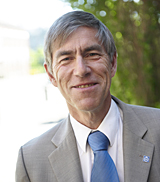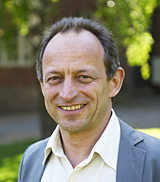KTH won EU assignment for innovations
Minister for Higher Education and Research: A feather in the cap for Swedish research
KTH forms part of the two winning consortia that will make Europe a global leader for innovations in ICT and Sustainable Energy. The prestigious EU collaboration EIT has formed three new so-called Knowledge and Innovation Communities (KIC) with a completely new outlook as to how innovations can be developed.

KTH is involved as a leading party in two of these KICs which will be striving towards a more in-depth integration of research, education and innovation. The purpose is to increase the EU countries’ global competitiveness through the development of more innovative products for the world market in strategically important areas.
The Minister for Higher Education and Research, Tobias Krantz, is pleased by the Swedish successes:
“Strengthening cooperation between academia and industry has been a prioritised issue during the Swedish Presidency of the EU. It is of vital importance to strengthen Europe’s competitiveness. The European Institute of Technology is an important operator in the development of the so-called ‘knowledge triangle’. Naturally it feels good that Sweden and KTH have been chosen to participate at such an early stage. This is a feather in the cap for Swedish research” he says.
KTH is assuming a leading role in the consortiums “EIT ICT Labs” and “KIC InnoEnergy”, selected in tough competition by EIT’s board on Wednesday evening. Within the consortia, there are research institutes, major engineering companies and several leading technical universities in Europe.
“It feels fantastic. This provides KTH with amazing development opportunities together with the leading universities, institutes and industries in Europe. It is tremendous that we have succeeded in bringing a major application to fruition,” says Gunnar Landgren, vice President of KTH, responsible for co-ordinating the application for “EIT ICT Labs”.
The work in EIT is organised in different so-called KICs with each one having an annual budget of SEK 1.5 billion crowns and which will be working on a long-term basis with a perspective of 7-15 years. Now that KTH, as a leading party, is becoming involved in building up two KICs it can only be described as a powerful recognition of KTH’s strengths within the areas of ICT and sustainable energy solutions.
“EIT ICT Labs” is focused on software engineering and IT services. The consortium’s primary nodes are in Stockholm, Berlin, Eindhoven, Helsinki and Paris. The Swedish node, with KTH as the major partner in cooperation with SICS, Ericsson and TeliaSonera will, among other things, be responsible for educational issues and for the area mobile communication.
“A central part of the consortium is to transform research into business concepts, entrepreneurship and growth. The creation of a positive view of entrepreneurship during the education itself will be of importance for the provision of skills for Europe’s future,” says Gunnar Landgren.

KTH is also a major partner in the consortium “KIC InnoEnergy”. This is where Sweden, through KTH and Uppsala University, will be responsible for the areas ‘smart electricity network’ and ‘electrical energy storage’ in cooperation with ABB and Vattenfall. The following nodes Karlsruhe, Grenoble, Eindhoven/Leuven, Barcelona and Krakow are also included in the consortium.
“Our successful application confirms that Stockholm/Uppsala is one of the leading operators in sustainable energy systems and energy development. We now have an extremely important assignment which is to lead and strengthen the innovative work which is being done within the energy area in Europe,” says Ramon Wyss, vice President of KTH, who has been responsible for coordinating the application work on the Swedish side.
The concrete work within the consortia include activities both at an overall European level and at a local level within the different nodes. In “KIC InnoEnergy”, KTH together with Uppsala University will build up an innovation centre which will specialise in environmental technology and sustainable energy solutions with activities at both of the universities campuses.
“The centre will be one of several exciting meeting places which will provide connections between industry, research and education, and which will be expected to lead to a new spirit of entrepreneurship and creativity. The centre will become a combination of a laboratory environment, a learning environment and a business development unit, says Ramon Wyss.
In “EIT ICT Labs”, KTH will create a number of activities in Kista. Together with, among others, STING and the Electrum Foundation, we will be running projects which will integrate education, research and innovation in an attempt to strengthen the local innovation system.
There will now be a period of a few months of formal contractual negotiations before operations can start up in earnest. The details regarding how the work will be formulated within each KIC will gradually become clear as all the formalities and the strategies will be transformed into concrete operational plans for each consortium.
More information:
- Gunnar Landgren, vice President, KTH, coordinator of EIT ICT Labs, e-mail: gl@kth.se, 08-7904222, website of the consortium: www.eitictlabs.eu
- Ramon Wyss, vice President, KTH, coordinator of KIC InnoEnergy, e-mail: wyss@nuclear.kth.se, 08-7908409
Christer Gummeson

